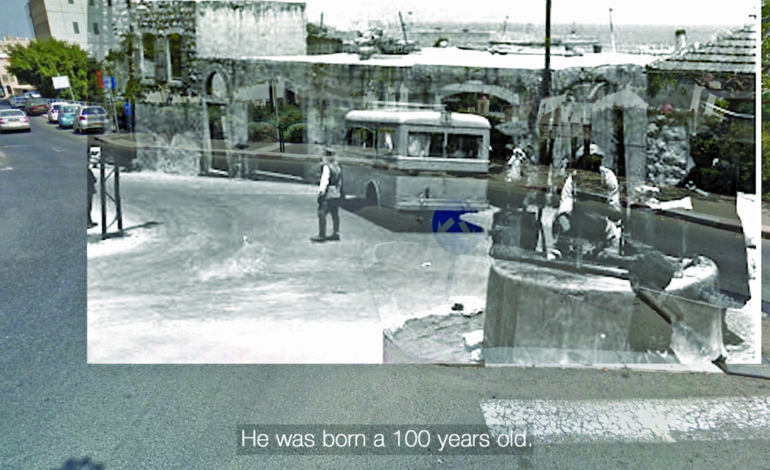ANN ARBOR – Filmmaker and media artist Razan AlSalah has enjoyed presenting content in a performative way since her primary schooling while growing up in Beirut, Lebanon.
On March 25, AlSalah won the Barbara Aronofsky Award for an Emerging Experimental Video Artist at the 56th Ann Arbor Film Festival.
Her short film, “Your Father was Born 100 Years Old, And So was the Nakba”, follows AlSalah’s late grandmother Oum Amin through the streets of her hometown Haifa, Palestine. The audience follows Amin’s virtual ghost through Google Street View as AlSalah narrates a fictional version of her grandmother’s experience and story.
AlSalah, who is an adjunct assistant professor at Temple University, where she teaches media arts theory and practice, survey of new media, audio production and more, said her grandmother was a Palestinian refugee from Haifa who went to Beirut upon being exiled in 1948. The script is based off research with her father (who was 3-years-old when his mother was exiled), the Internet and the region’s collective history.
AlSalah, 30, said she channeled her grandmother both while writing the piece and when visiting the area through Google Street View.
“I truly believe that she took part in writing the film,” she said. “Even if she’s not here. I allowed my knowledge of her temperament to take over the character that was traveling through the streets. She was very much interacting with the landscape, with different people and with what I know is her temperament.”
When AlSalah first showed the film to her peers at Temple University they told her she needed to submit it to the Ann Arbor Film Festival.
“It’s one of those legendary film festivals you hear about,” AlSalah said, “an experimental film festival that understands an alternative cinematic language.”
She said watching the various films over the course of the festival was a gift and that she really appreciated seeing all of the experimental films.

She also said she thought the festival’s curators deserve credit for giving a platform to so many diverse and experimental artists.
AlSalah, who earned her bachelor’s degree in communication arts from the Lebanese American University in 2007, came to the United States in 2014 on a Fulbright Scholarship from the Master’s of Fine Arts Program at Temple University. She obtained her master’s in film and media arts in 2017.
In addition to teaching at Temple, AlSalah is also a mentor at the CAMRA Fellows Program at the University of Pennsylvania.
When she first began the program, she intended on concentrating on media arts. She said she created three years of exclusively media arts work before venturing into film.
“It started as a preference,” she said. “But really transformed into an understanding of the strong relationship between form and content.”
AlSalah said the realization that form needs to carry content and content needs to be maximized through form helped her make this film.
Most of her work focuses on, “contemporary [dis]connection to space,” she said. “Whether because we consume places through technology or because we are simply not present, there is certainly a contemporary [dis]connection to the places we inhabit.”
She added that Google Street View is a good tool to demonstrate that tension.
“You are inside that landscape and you think you feel all the details,” she said. “It’s high resolution, but still you have no feet; you have no body that walks through that space.”
The inspiration behind the piece stems from a persistent feeling of connection and disconnection with Palestine, not “because she is on her phone all the time.”
“I feel this way because my family was uprooted from their home,” she said. “Capitalism and greed work with different faces, either through technology or more obviously through militarization.”

Razan AlSalah at the 56th Ann Arbor Film Festival
The piece also comes from the thought about being able to show her grandmother the space she’d been forced to leave.
During her research on the film, AlSalah discovered how difficult it is to find remnants of Palestine in her parents’ and grandparents’ homeland. Both the street where her father grew up and the cross street had changed their names.
Moreover, the Israelis demolished 112 homes the day after her family was exiled.
“It’s not just me writing this film,” she said. “It’s a lot of individual energies, experiences and spirits writing this film with me.”
Because of a patriarchal nationality law in Lebanon that procures citizenship based only on the father of the child, AlSalah is still technically a Palestinian refugee; her mother is Lebanese.
Despite this, “I am very much Lebanese in my heart and soul,” AlSalah said.
She has had work shown at the Hot Docs Film Festival and the Blackstar Film Festival and has work in the “permanent collection” of the Sursock Museum in Beirut.
All of her work can be found on RazanAlSalah.com






Leave a Reply